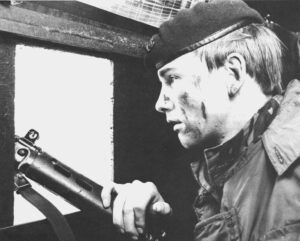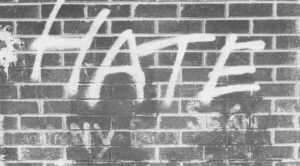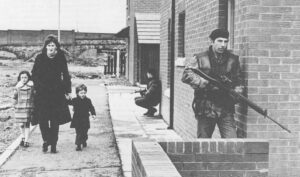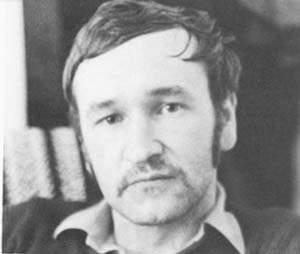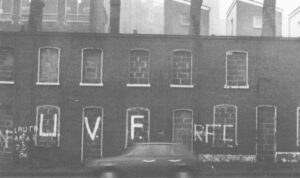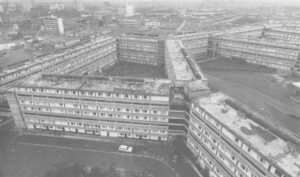BELFAST–On May 27,1980, in a suburb of Belfast, sixty outraged citizens paraded outside their town hall. When the councilmen of Newtonabbey arrived for their scheduled meeting, the demonstrators became impassioned, “Murderers, ” they yelled at their elected representatives, “murderers.”
The picketers hoped to persuade their councilmen to deny Abbey Meats a license to carry out the ritual slaughter of bullocks. The meat company had received a 4 million pound contract to provide beef to Libya, and the contract required the company to slaughter the animals in the Islamic tradition. The procedure performed at Abbey Meats involved penning the castrated bull in a confined space, and while the animal was still fully conscious, raising its head and slitting its throat. The Belfast papers reported that an Arab had been brought to Northern Ireland specifically to oversee the task.
Those who objected to the killing thought the method was too brutal, that the animal should have been stunned first. At the council meeting attended by the demonstrators, the town fathers decided to grant Abbey Meats the required license, but agreed they would revoke it if, after inspection, they found the method caused unnecessary suffering. The protestors’ leader, Mr. Jack McDowell, rose to his feet after the vote, still angry. “May God forgive you all,” he said.
A week later, a weekly community newspaper serving Belfast’s Catholic ghetto snidely noted that the residents of Newtonabbey had shown far more concern about the slaughter of cattle than they had about the recent killings of teenagers in joyriding incidents. Joyriders are teenagers in the Catholic ghettoes who steal cars and drive them at army checkpoints, refusing to stop. This is considered great sport. Soldiers manning the checkpoints, not sure if the car bearing down on them is a teenager out for kicks or a terrorist out to kill them, tend to shoot first and ask questions later, though army regulations forbid such reckless, but understandable, shooting. Around the time of the Abbey Meats protest, three teenagers were killed and several others were wounded by army gunfire.
I tell this story to drill home the point that Northern Ireland is by no means consumed by war, an idea many Americans, many English, and even many residents of the Republic of Ireland cannot quite grasp. Most of the people of Northern Ireland are like the residents of Newtonabbey-unaffected, at least on the surface, by the twelve-year-old war. Certainly they pity those caught up in it, but their pity generates little active concern. And so it is that they are not contributing to peace groups, writing their elected representatives, or marching in the streets pressing for an end to the conflict. Many of the well educated members of the populace, the people who know something about power and how to use it, have either emigrated or opted out. The army has been successful in keeping the war out of their neighborhoods and out of their minds, and they feel no pain. They object to people like me who say there is a war going on. To them, there is no war, there is sporadic violence, ritual killing off in the ghetto. The animals aren’t stunned first, but that is not their concern.
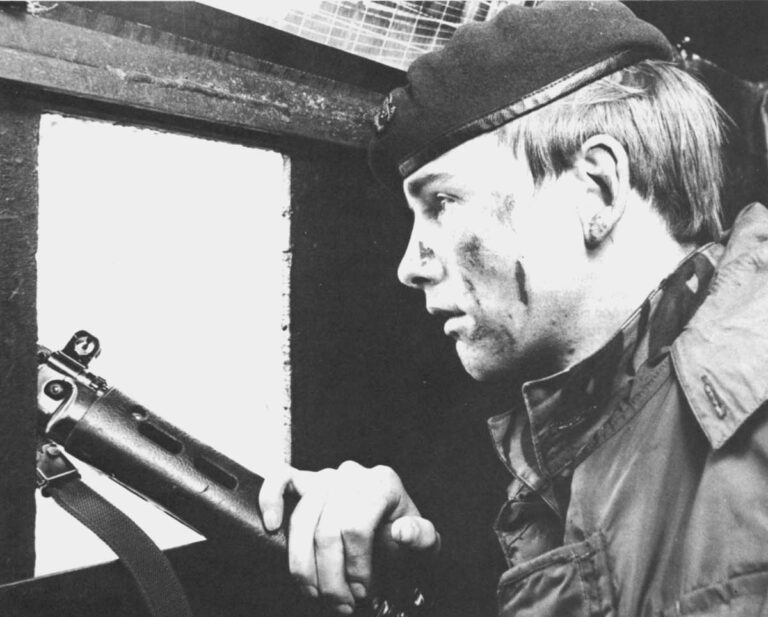
Last spring, in the city of Armagh, I met a pipe-smoking, well educated Englishman nearing 40, a major in the British Army, unusual only in that he was Catholic. After three tours of Northern Ireland in the past 12 years, he was skeptical that the conflict would ever end. There is just no impetus, coming from the Northern Irish to settle the conflict, he said. He believed that the pressure for a settlement comes from outside, from England, Ireland, and even the United States.
Scams and Loopholes
On a tour of the city, the major pointed out local displays of prosperity to bolster his argument. The new cars on the road and the new houses being built in middle class areas are indicators of the fortunes of the upper classes, he said, fortunes which have not suffered in the least as a result of the troubles. Solicitors and barristers have made very good money with the change from a law abiding society to a law breaking one. Some merchants and businessmen have benefited from the government compensation scheme which helps victims of terrorist crimes rebuild their bombed-out stores and offices. Until a few years ago, there were loopholes in the scheme, and some citizens made fortunes, immorally but not illegally, by skillfully bending the regulations.
While the major didn’t argue with the compensation program, a few people have suggested that if the scheme was eliminated, then Catholic businessmen who were bombed by the IRA would be more anxious to be rid of that wild bunch, that merchants would be more willing to cooperate with the police and army and would be more active in their own communities fighting terrorism. The arguments against the elimination of compensation are obvious: it would cause great agony, emigration of the merchant class might double, and Protestant businessmen would probably be more likely to aid and enlist in the ranks of Protestant paramilitary groups.
In his list of people who have been soothed into an uncaring attitude, the major also mentioned the police. Policemen in Northern Ireland are quite well paid these days, and with overtime wages earned in recent years, many are rich men.
“There’s just too much money being made here now,” the major said, “for there to be any interest inchanging things.”
And then there is the other nation, the working class pockets spread around the province, where most of the war’s effects have registered. I am most familiar with the walled-in compound of Catholic West Belfast, where the frontier, the border, is formed by corrugated iron walls and politically placed roadways. Border crossings are marked by gates that swing open and shut at the will of the army.
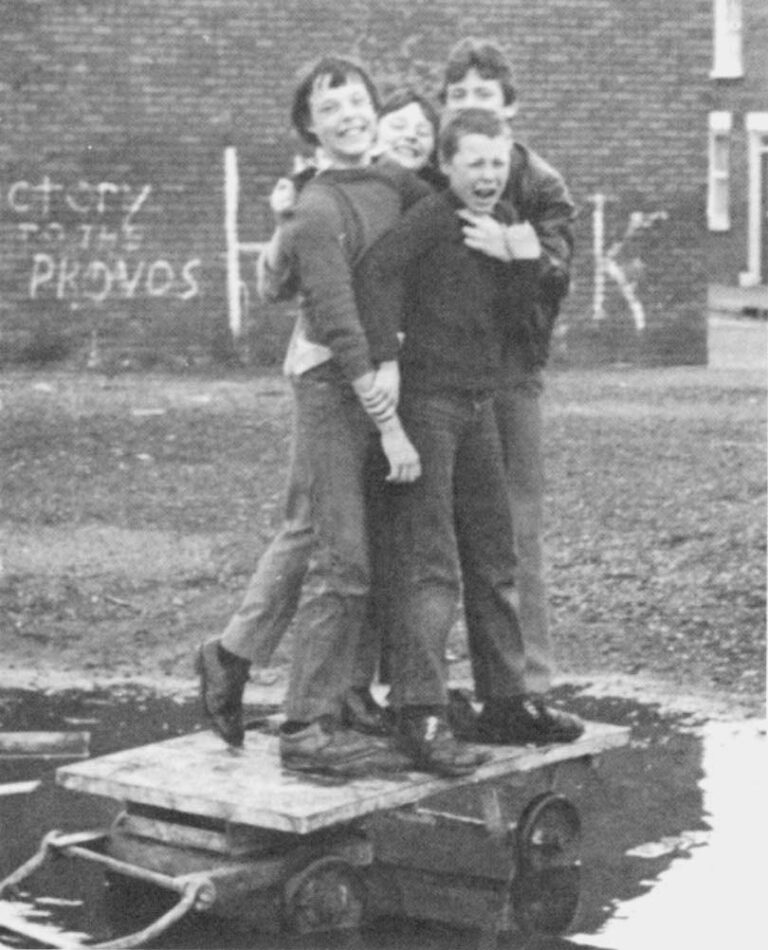
The residents don’t object to the walls at all, as they protect as well as confine. Like participants in a work release program, some of them leave the ghetto by day to go to jobs downtown. They are frisked on their way into the city center, and if they enter at Castle Street, the primary entrance used by Catholics, they are apt to be pulled aside, questioned, delayed, perhaps detained, perhaps even held for seven days without being charged with any crime. There are no soldiers at the Protestant gates.
While it would seem to be in the army’s interest to contain the conflict within the walls of West Belfast, in the long run the containment has had a disastrous effect. In 12 years, a tremendous counterculture has developed, one that will be hard to suppress if a British military victory ever brings peace.
Families in West Belfast, for example, are probably unique in Western Europe, perhaps unique in the entire world, for their proud advertising that their kin have done time in prison. The advertisement takes the form of a carved wooden harp, a common sight in many windows on the back streets. The harp is to the Republic of Ireland what the eagle is to the United States, a national symbol. The harps on the window sills in Belfast are prison crafts, assembled by IRA men who have done time for the cause, and they are symbols of resistance, of allegiance to another country.
Just as American veterans drink in American Legion outposts, so some veterans of the Irish Republican Army drink in a club called the Felons’ Association. Just as American veterans march in parades, so hundreds of men marched this past fall behind banners identifying them as ex-cons, banners saying “Andersonstown Ex-Prisoners Association” and “Lower Falls Former Prisoners of War.”
This separate nation concept is so pervasive in West Belfast that even the animals seem to have picked it up. One ex-IRA man boasts of his friend’s two talking birds; one bird says “Fuck the Brits,” the other “Up the Provos.” The dogs also have Republican politics. Many are trained to harass soldiers. At one post I visited the soldiers had hung a wanted poster, much like the ones which identify local IRA men; this one displayed the pictures, names, descriptions, and haunts of local dogs.
This ghetto-nation has its own patriotic songs and recording artists. Tunes recorded for the Republican market celebrate a sniper who promises to put away his gun once freedom has been won; the escape of a group of IRA men from prison by helicopter; and the derring-do of the Belfast IRA and the men of Crossmaglen. One country and western number tells of Jesus Christ and Jesse James riding through West Belfast. Jesse, impressed by the lawlessness of the place, says he hasn’t felt as good since he robbed his last train. Jesus, eyeing the burned out houses and the tangle of barbed wire, remarks, “I never thought I’d see the like of Calvary again.” He raises his hand to bless the bleak site and is grazed by a bullet, inspiring the remark, “I guess that old stigmata is infectious in this land.”
Every Easter, the IRA parades through West Belfast to mark the anniversary of the Easter rebellion, the uprising which led to independence for the Republic. The ghetto’s other big holiday is August 9, marked by parades, bonfires, speeches and impromptu hijackings of passing cars, all part of the celebration of the anniversary of the first internment raids. At dawn on August 9,1971, the British began arresting hundreds of Catholic men on suspicion that they were IRA members. The men were jailed indefinitely, without charge, in Long Kesh, an airbase built by American forces during World War 11, converted to a prisoner of war compound for this occasion. The policy was a massive abuse of civil liberties that lasted four years, and it is generally thought to be the greatest recruiting tool the IRA ever had; the majority of those arrested had nothing to do with the guerrillas, but after their arrest they became willing recruits.
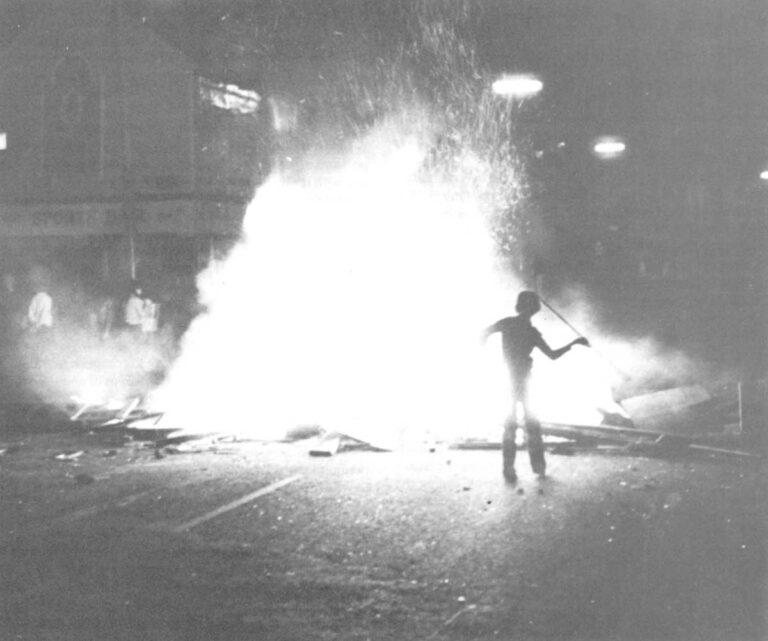
Internment set in motion an economic system peculiar to the ghetto. The community’s politicians organized a civil disobedience campaign as a protest against the arrests. Catholics refused to pay rent to the housing authority, or to pay electricity and gas bills, or taxes on their cars and homes. Unfortunately, no one collected the money and held it in escrow, and so people spent it, assured by their leaders that they would not have to pay it back. Then Parliament passed the Payment for Debt Act, permitting the government to collect what was owed on rent and utility bills by making deductions from a family’s welfare check, or by forcing employers to put liens on employees’ paychecks. It is a very expensive collection process, costing a pound to collect a pound, but it persists to this day.
Doing the Double
By the time the enforcers caught up with the debtors, great portions of the community were thousands of pounds in debt, and with the deductions in their welfare benefits, many could not put food on the table. They began what is known in Northern Ireland as ” doing the double” -holding down a job while collecting unemployment benefits. With the general breakdown of law and order, welfare inspectors were scared to death to patrol West Belfast, and so thousands began playing the game.
Some of the Catholic employers, however, played a new game as well. Since they knew their workers were cheating, they began paying them less than subsistence wages, knowing that the workers had no one they could complain to, knowing also that if they quit, there would be dozens of applicants willing to take their jobs despite the pitiful wages. The result is a culture with incredibly low wages, and a great sense of futility about the benefits of paid labor. One 18-year-old kid I know took a job at a hairdresser’s for 13 pounds a week; his friends thought he was crazy, as he could have gotten E 13 a week on the dole. Another acquaintance, a 19-year-old named Margaret, works a 40 hour week in a laundromat for about13 pounds. Her employer knows she is doing the double, and so pays her as little as he can. She cheats because her wages are so low, and her wages are so low because she cheats.
Nurseries for Hate
Children growing up in this culture live in a very small world, and they pick up their allegiances early. There is almost no understanding of their contemporaries on the Protestant side of the ghetto border. The only time Catholic and Protestant working class kids associate with each other is when they attend some community relations program run by some liberal group or by the police department, the latter not being a very popular group in Republican ghettoes. Foreign charities sometimes select a mixed group, take them out of Northern Ireland, and expose them to a different life. When a kid returns home to where his prejudices were fostered, it is only the most extraordinary who don’t fall right back into them.
In West Belfast, young boys are avid followers of the Cliftonville Football Club, a semi-pro soccer team. The teenage boys who make up most of the club’s fans are so devoted that they have cast the players as standard bearers for the ghetto, as members of the national team.
The Cliftonville team is not a collection of great talent, but it is a very spirited club, and in key games it plays far better than it should be able to. About four times a year, Cliftonville meets Linfield, a topranked, well-heeled, professional team composed entirely of Protestants, and followed by a notorious crowd of hooligans from Protestant working class neighborhoods. When the two squads meet, the police force shudders. The biggest police operation in the history of the province has nothing to do with terrorism-it is just normal duty for a Cliftonville Linfield match.
The police frisk the fans of both squads as they enter the stadium, line the stands wearing riot gear, patrol the field with police dogs, and do whatever they can to keep the two warring factions from getting within 75 yards of each other. The Cliftonville supporters, though raised with a deep distrust of the constabulary, are much easier on the police than the Protestant crowd, perhaps because the Catholic crowd is smaller, but perhaps also because they are grateful for the police escort through hostile territory to Linfield’s stadium. Linfield refuses to play at Cliftonville’s park, called Solitude, because it fears the Catholic ghetto. This refusal prompts the Catholic fans to sing, “Who’s afraid of Solitude?” when the two teams meet, a question both sides would do well to consider.
There are other, less gentlemanly jibes flung from the Cliftonville side of the stadium. The Catholic crowd likes to hum, “God Save the Queen”, for instance, moving their hands all the while as if they were masturbating in unison. There are several cheers supporting the IRA, including “Warren, Warren, Warrenpoint,” a reminder of the day Lord Mountbatten was blown up in his boat, when 18 soldiers were also killed by the Provisional IRA in an ambush near the town of Warrenpoint. There is also a joke known and told by Cliftonville supporters about the killing: “Question: How do you know Lord Mountbatten had dandruff? Answer: Because they found his head and shoulders on the beach.”
The Protestant side is no more refined. Linfield supporters cheer, “Shankill butchers, hello,” reminding the Cliftonville side of the gang that mutilated the bodies of I I Catholics in torture murders a few years ago. “We are the boys from Derry,” another Linfield cheer begins, “fuck the Pope and the Virgin Mary.” Another favorite is a song, done to the tune of “Home on the Range”, which wishes for the heavenly day when there will be no Popes, no nuns, no priests, no rosary beads, when every day will be the 12th of July. The 12th of July is a Northern Ireland national holiday, marking a victory of Protestants over Catholics in 1690.
Sitting in either section of the stadium is frightening. The crowds, particularly Linfield’s, get quite physical in the abuse they throw at the police, and the police, in turn, charge the Linfield fans with their batons raised. The attack and retreat of the hooligans sends ripples of shoving and pushing through the stands.
The experience is also disheartening. It is hard to keep in mind that this is a football game, not a gang war, that the action on the field is what is important, not the activity in the stands. Cliftonville Linfield matches drive home the point that today, 12 years after the violence began, its end is nowhere to be seen. The values which gave rise to the bloodshed have been passed on to another generation. It is worse now, however, than it was in the days of the older generation, who at least knew a time of peaceful co-existence. These kids have known nothing but perpetual combat, frustration, anger, suspicion, and hatred. This is normal life, they think.
A few months ago, I made the acquaintance of a short, smiley, 13-year-old named Eamon, one of those names that identifies not only a person, but the person’s religion as well, which is, of course, Catholic. Eamon lives in a flat with 8 brothers and sisters, an alcoholic father, and a mother a bit fond of the drink herself, who is straining to hold the family together but slowly losing her grip. They live in the worst part of the ghetto. Policemen never enter the neighborhood without an army escort, male unemployment is about 60 percent, 8- and 9-year-olds can be seen drunk on weekend nights, and just about every other family has someone in jail or just out.
Eamon gets along there just fine. With the exception of the time he tried to beat up a 200 pound policeman singlehandedly, a policeman who had done nothing more than wear a uniform, Eamon has always shown good sense. He is known for his street wisdom and resourcefulness, and has wheedled jobs in the markets near the city center for some of his 12- and 13-year-old pals. His teacher told me that she first met him last fall, when she was shopping downtown and Eamon approached and tried to sell her a digital watch.
One day last fall, the teacher began a discussion about the troubles, referring to the conflict as a war. Eamon was perplexed, perhaps even worried. “This war you’re talking about,” he said to his instructor, “when is it gonna start?”
©1981 John Conroy
John Conroy concludes his fellowship on the Social and Economic Consequences of War in Northern Ireland with this issue.

